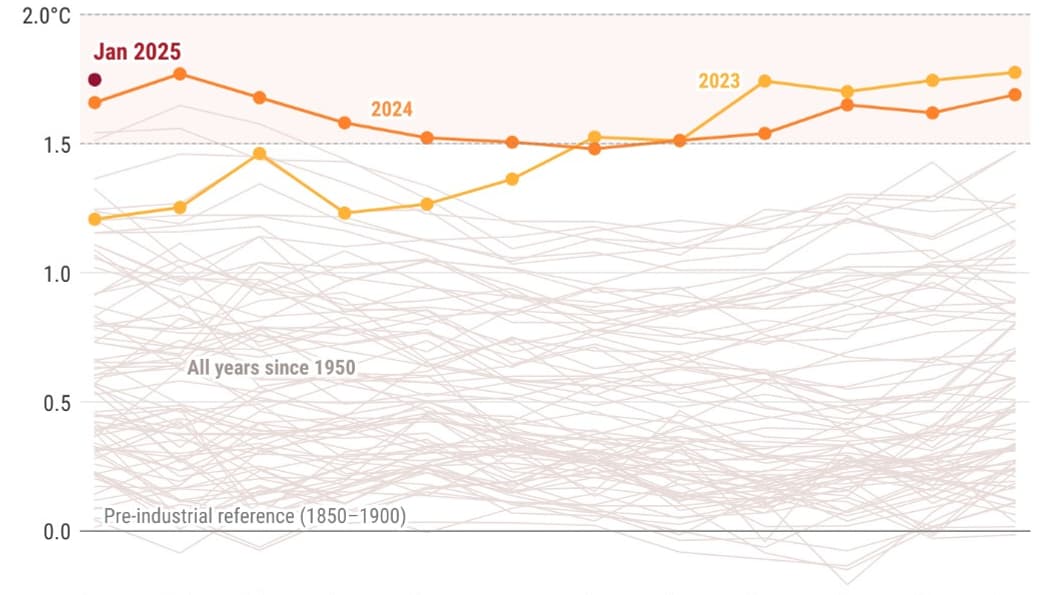"A surprising month": January 2025, the hottest month ever measured in the world despite the end of El Nino

January 2025 was the warmest January ever recorded worldwide , according to the European Copernicus Observatory , dampening hopes that the La Niña phenomenon will interrupt nearly two years of record temperatures, mainly due to human-caused global warming.
“January 2025 is another surprising month, continuing the record temperatures seen over the past two years, despite the development of La Niña conditions in the tropical Pacific and their temporary cooling effect on global temperatures,” Samantha Burgess, deputy director of Copernicus’ Climate Change Service (C3S), said in her monthly update published on Thursday.
With an average temperature of 13.23°C according to Copernicus, "January 2025 is 1.75°C above the pre-industrial level", before humans profoundly modified the climate through the massive use of coal, oil and fossil gas.
Scientists had expected the record-breaking years of 2023 and 2024, the two warmest ever measured, to end with the end of the natural warming phenomenon El Niño and the arrival of its opposite, La Niña .
"That's what's a bit surprising... we don't see this cooling effect, or at least temporary brake, on global temperature that we expected to see," Julien Nicolas, a Copernicus climatologist, told AFP.
Copernicus even notes signs of "a slowdown or a halt in the evolution towards La Niña conditions", which could disappear completely by March, according to the climatologist.
Global temperatures, whose rise has fueled droughts, heatwaves and devastating floods, are highly dependent on sea temperatures. However, the surface temperatures of the oceans, essential regulators of the climate that cover more than 70% of the globe, remain at levels never seen before April 2023.
For the ocean surface, January 2025 ranks as the second warmest month behind the absolute record of January 2024. In the Arctic, where the winter is very abnormally warm, the ice pack reached its lowest extent for a month of January, practically equal to 2018, according to Copernicus.
With this temperature record, January 2025 becomes "the eighteenth of the last nineteen months for which the average air temperature on the surface of the globe has exceeded the pre-industrial level by more than 1.5°C", the European observatory also notes.
This is more than the symbolic threshold of +1.5°C , corresponding to the most ambitious limit of the 2015 Paris Agreement, which aims to contain global warming well below 2°C and to pursue efforts to limit it to 1.5°C.

This agreement, however, refers to long-term trends: such an average of warming will have to be observed over at least 20 years to consider the limit crossed.
Using this criterion, the climate is currently warming by about 1.3°C. The IPCC estimates that the 1.5°C mark will probably be reached between 2030 and 2035. And this is regardless of the evolution of humanity's greenhouse gas emissions, which are now close to peaking but not yet declining.
While most climate scientists believe that these successive records do not invalidate the projections, while being at the high end of their estimates, some scientists on the fringes hypothesize that the climate is warming faster due to human-caused greenhouse gas emissions.
"Are we able to discern a stronger climate response? For the moment there are some elements, but not yet I would say any observation, any demonstration, of a stronger response than that expected", summarizes Valérie Masson-Delmotte, eminent climatologist.
Studies are underway to make a decision, but in any case, "in a climate where we continue to add greenhouse gases, we should not be surprised that we are breaking heat records," recalls this former senior IPCC official.
BFM TV


%3Aquality(70)%3Afocal(3304x1555%3A3314x1565)%2Fcloudfront-eu-central-1.images.arcpublishing.com%2Fliberation%2F2DPPZNA6NRE47H7QQR4DTWBIGQ.JPG&w=3840&q=100)
%3Aquality(70)%3Afocal(2906x2437%3A2916x2447)%2Fcloudfront-eu-central-1.images.arcpublishing.com%2Fliberation%2FQVWLSATXBRDHLHH6YRL7IMYZZA.jpg&w=3840&q=100)
%3Aquality(70)%3Afocal(3584x2364%3A3594x2374)%2Fcloudfront-eu-central-1.images.arcpublishing.com%2Fliberation%2FJMMX5HII25ENPBBCGUUYFVO27I.jpg&w=3840&q=100)
%3Aquality(70)%3Afocal(2019x1596%3A2029x1606)%2Fcloudfront-eu-central-1.images.arcpublishing.com%2Fliberation%2FQTBY6FLFIBFJJDYZQB7HEUTRVQ.jpg&w=3840&q=100)
%3Aquality(70)%2Fcloudfront-eu-central-1.images.arcpublishing.com%2Fliberation%2FGKOIEK4TJREC5O7G6IDACGNGIY.JPG&w=3840&q=100)